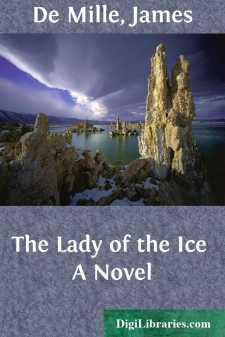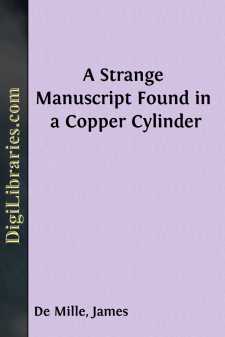Categories
- Antiques & Collectibles 13
- Architecture 36
- Art 48
- Bibles 22
- Biography & Autobiography 813
- Body, Mind & Spirit 142
- Business & Economics 28
- Children's Books 17
- Children's Fiction 14
- Computers 4
- Cooking 94
- Crafts & Hobbies 4
- Drama 346
- Education 46
- Family & Relationships 57
- Fiction 11829
- Games 19
- Gardening 17
- Health & Fitness 34
- History 1377
- House & Home 1
- Humor 147
- Juvenile Fiction 1873
- Juvenile Nonfiction 202
- Language Arts & Disciplines 88
- Law 16
- Literary Collections 686
- Literary Criticism 179
- Mathematics 13
- Medical 41
- Music 40
- Nature 179
- Non-Classifiable 1768
- Performing Arts 7
- Periodicals 1453
- Philosophy 64
- Photography 2
- Poetry 896
- Political Science 203
- Psychology 42
- Reference 154
- Religion 513
- Science 126
- Self-Help 84
- Social Science 81
- Sports & Recreation 34
- Study Aids 3
- Technology & Engineering 59
- Transportation 23
- Travel 463
- True Crime 29
James De Mille
James De Mille was a prolific Canadian writer born on August 23, 1833, and known for his works of adventure fiction, historical novels, and satire. He is best remembered for his novel "A Strange Manuscript Found in a Copper Cylinder" (1888), which combines elements of science fiction and utopian literature. De Mille's writing often reflected his diverse interests and experiences, including his travels and his academic career as a professor of classics at Dalhousie University in Halifax, Nova Scotia.
Author's Books:
Sort by:
by:
James De Mille
CHAPTER I. CONSISTING MERELY OF INTRODUCTORY MATTER. This is a story of Quebec. Quebec is a wonderful city. I am given to understand that the ridge on which the city is built is Laurentian; and the river that flows past it is the same. On this (not the river, you know) are strata of schist, shale, old red sand-stone, trap, granite, clay, and mud. The upper stratum is ligneous, and is found to be very...
more...
by:
James De Mille
It was a beautiful morning, in the month of July, when a crowd of boys assembled on the wharf of Grand Pre. The tide was high, the turbid waters of Mud Creek flowed around, a fresh breeze blew, and if any craft was going to sea she could not have found a better time. The crowd consisted chiefly of boys, though a few men were mingled with them. These boys were from Grand Pre School, and are all old...
more...
by:
James De Mille
CHAPTER I. A TERRIBLE SECRET. On a pleasant evening in the month of May, 1840, a group of young ladies might have been seen on the portico of Plympton Terrace, a fashionable boarding-school near Derwentwater. They all moved about with those effusive demonstrations so characteristic of young girls; but on this occasion there was a general hush among them, which evidently arose from some unusual cause....
more...
by:
James De Mille
CHAPTER I THE FINDING OF THE COPPER CYLINDER It occurred as far back as February 15, 1850. It happened on that day that the yacht Falcon lay becalmed upon the ocean between the Canaries and the Madeira Islands. This yacht Falcon was the property of Lord Featherstone, who, being weary of life in England, had taken a few congenial friends for a winter's cruise in these southern latitudes. They had...
more...
by:
James De Mille
. PARIS.--THE DODGE CLUB.--HOW TO SPEAK FRENCH.--HOW TO RAISE A CROWD. ILLUSTRATIONS. Dick!--Here I Invite My Friends.--The Club.--The Place Vendôme.--Keep It Buttons! . ORLEANS.--HOW TO QUELL A LANDLORD.--HOW TO FIGHT OFF HUMBUGS; AND HOW TO TRAVEL WITHOUT BAGGAGE. ILLUSTRATIONS. That's A Hotel Bill.--Cicero Against Verres. --Sac-r-r-r-ré. . THE RHONE IN A RAIN.--THE MAD FRENCHMAN.--SUICIDE A...
more...
by:
James De Mille
CHAPTER I. A VOICE OUT OF THE DEEP. Once upon a time there was a schooner belonging to Boston which was registered under the somewhat singular name of the "Rev. Amos Adams." This was her formal title, used on state occasions, and was, no doubt, quite as appropriate as the more pretentious one of the "Duke of Marlborough," or the "Lord Warden." As a general thing, however, people...
more...
by:
James De Mille
CHAPTER I. THE LETTER FROM BEYOND THE SEA. On the morning of July 21, 1840, the Daily News announced the arrival of the ship Rival at Sydney, New South Wales. As ocean steam navigation had not yet extended so far, the advent of this ship with the English mail created the usual excitement. An eager crowd beset the post-office, waiting for the delivery of the mail; and little knots at the street corners...
more...
by:
James De Mille
CHAPTER I. Stranger in a strange Land.—A Citadel of Trunks.—Besieged.—Retreat in good Order.—A most tremendous Uproar.—Kicks! Thumps!—Smash of Chain!—Crash of Tables!—A general Row!—The Cry for Help!—The Voice of David!—The Revelation of the Darkness!—The fiery Eyes!—The Unseen!—The Revelation of the Mystery.—A general Fight. Mr. Moses V. Sprole had passed the greater part...
more...
by:
James De Mille
CHAPTER I. HOW A PARTY OF TRAVELLERS SET OUT ON A JOURNEY. The train for the North was about to start from Madrid, and the station was filled with the usual varied and bustling crowd. Throngs of soldiers were there; throngs of priests; throngs of civilians; throngs of peasants; all moving to and fro, intermingled with the railway employés, and showing the power of steam to stir up even the lazy...
more...











